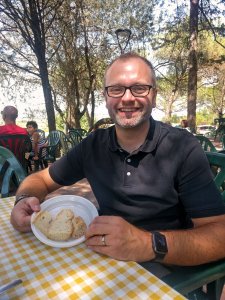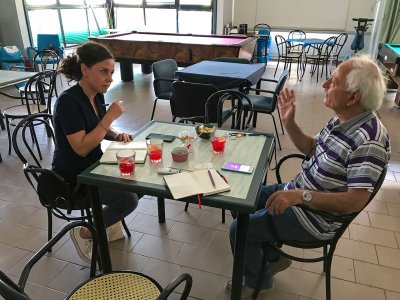Food for Thought
Ohio Wesleyan Professor Studies Food Traditions, Community in Italy

Over the past eight years, more than 50 Ohio Wesleyan University students have traveled to Italy to explore food studies as a result of classes and research collaborations with Christopher Fink, Ph.D., associate professor of Health and Human Kinetics.
While the pandemic has temporarily stopped the travel, Fink has continued his work, publishing this semester the results of research conducted between 2016 and 2018 with Elisa Ascione, Ph.D., coordinator of the Center for Food and Sustainability Studies at Italy’s Umbra Institute, a U.S. study abroad program.
The Importance of Festivals
Titled “Italian sagre: preserving and re-inventing cultural heritage and community through food festivals in Umbria, Italy,” their research appears in the Feb. 26 edition of Food, Culture & Society: An International Journal of Multidisciplinary Research. The quarterly journal is published on behalf of the Association for the Study of Food and Society.
“We studied Italian festivals called sagre (sagra, singular), which are often located in small towns and rural areas, and celebrate important local foods or dishes,” said Fink, a member of the Ohio Wesleyan faculty since 2007.
“These festivals are organized by the local community, and the funds are used for various community uses – Iike supporting local recreation, village restoration, or small-scale, local food production,” said Fink, who focuses his teaching on interdisciplinary food studies, dietary health, community health, and issues related to dietary decisions and the food system, including food insecurity.”
Strengthening Community Roles

“We examined ways that the community organizes itself in this way – and also how the region of Umbria regulates these sagre and fosters regional tourism” he said. “The research is important because so many aspects of food in Italy are focused on exporting tradition outside of Italy, and because food and community are inextricably linked.
“It’s also important to know how efforts by local and regional governments, while trying to protect consumer safety and local industry, can also work to homogenize local food traditions by regulating ways of preparing and distributing food,” Fink said. “It’s important to show how food can serve as a way for community roles to be strengthened – for adults, children, and families.”
Collaborating With OWU Students
As for his future plans, Fink said he looks forward to continuing to include Ohio Wesleyan students in his research.
“I have worked a lot with OWU students on various food-focused projects in Italy,” he said, “like explorations of short food supply chains and how these impact quality of life, how local and regional food systems link to factors predicting longevity, and explorations of the Mediterranean Diet and which aspects of it are most strongly represented in contemporary Umbria. … Moving forward, I want to involve students in further study of these festivals and the community structures that support them, and are supported by them.”
Watch Fink's i³ mini-lecture, "Authentic Pot Pie Has No Crust."
Learn more about Fink and Ohio Wesleyan’s Department of Health and Human Kinetics at owu.edu/hhk.
